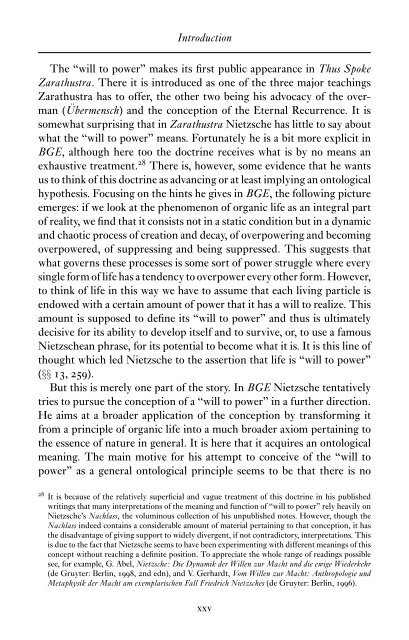Beyond Good and Evil: Prelude to a Philosophy of the Future - EILFE
Beyond Good and Evil: Prelude to a Philosophy of the Future - EILFE
Beyond Good and Evil: Prelude to a Philosophy of the Future - EILFE
Create successful ePaper yourself
Turn your PDF publications into a flip-book with our unique Google optimized e-Paper software.
Introduction<br />
The “will <strong>to</strong> power” makes its first public appearance in Thus Spoke<br />
Zarathustra. There it is introduced as one <strong>of</strong> <strong>the</strong> three major teachings<br />
Zarathustra has <strong>to</strong> <strong>of</strong>fer, <strong>the</strong> o<strong>the</strong>r two being his advocacy <strong>of</strong> <strong>the</strong> overman<br />
(Übermensch) <strong>and</strong> <strong>the</strong> conception <strong>of</strong> <strong>the</strong> Eternal Recurrence. It is<br />
somewhat surprising that in Zarathustra Nietzsche has little <strong>to</strong> say about<br />
what <strong>the</strong> “will <strong>to</strong> power” means. Fortunately he is a bit more explicit in<br />
BGE, although here <strong>to</strong>o <strong>the</strong> doctrine receives what is by no means an<br />
exhaustive treatment. 28 There is, however, some evidence that he wants<br />
us <strong>to</strong> think <strong>of</strong> this doctrine as advancing or at least implying an on<strong>to</strong>logical<br />
hypo<strong>the</strong>sis. Focusing on <strong>the</strong> hints he gives in BGE, <strong>the</strong> following picture<br />
emerges: if we look at <strong>the</strong> phenomenon <strong>of</strong> organic life as an integral part<br />
<strong>of</strong> reality, we find that it consists not in a static condition but in a dynamic<br />
<strong>and</strong> chaotic process <strong>of</strong> creation <strong>and</strong> decay, <strong>of</strong> overpowering <strong>and</strong> becoming<br />
overpowered, <strong>of</strong> suppressing <strong>and</strong> being suppressed. This suggests that<br />
what governs <strong>the</strong>se processes is some sort <strong>of</strong> power struggle where every<br />
single form <strong>of</strong> life has a tendency <strong>to</strong> overpower every o<strong>the</strong>r form. However,<br />
<strong>to</strong> think <strong>of</strong> life in this way we have <strong>to</strong> assume that each living particle is<br />
endowed with a certain amount <strong>of</strong> power that it has a will <strong>to</strong> realize. This<br />
amount is supposed <strong>to</strong> define its “will <strong>to</strong> power” <strong>and</strong> thus is ultimately<br />
decisive for its ability <strong>to</strong> develop itself <strong>and</strong> <strong>to</strong> survive, or, <strong>to</strong> use a famous<br />
Nietzschean phrase, for its potential <strong>to</strong> become what it is. It is this line <strong>of</strong><br />
thought which led Nietzsche <strong>to</strong> <strong>the</strong> assertion that life is “will <strong>to</strong> power”<br />
(§§ 13, 259).<br />
But this is merely one part <strong>of</strong> <strong>the</strong> s<strong>to</strong>ry. In BGE Nietzsche tentatively<br />
tries <strong>to</strong> pursue <strong>the</strong> conception <strong>of</strong> a “will <strong>to</strong> power” in a fur<strong>the</strong>r direction.<br />
He aims at a broader application <strong>of</strong> <strong>the</strong> conception by transforming it<br />
from a principle <strong>of</strong> organic life in<strong>to</strong> a much broader axiom pertaining <strong>to</strong><br />
<strong>the</strong> essence <strong>of</strong> nature in general. It is here that it acquires an on<strong>to</strong>logical<br />
meaning. The main motive for his attempt <strong>to</strong> conceive <strong>of</strong> <strong>the</strong> “will <strong>to</strong><br />
power” as a general on<strong>to</strong>logical principle seems <strong>to</strong> be that <strong>the</strong>re is no<br />
28 It is because <strong>of</strong> <strong>the</strong> relatively superficial <strong>and</strong> vague treatment <strong>of</strong> this doctrine in his published<br />
writings that many interpretations <strong>of</strong> <strong>the</strong> meaning <strong>and</strong> function <strong>of</strong> “will <strong>to</strong> power” rely heavily on<br />
Nietzsche’s Nachlass, <strong>the</strong> voluminous collection <strong>of</strong> his unpublished notes. However, though <strong>the</strong><br />
Nachlass indeed contains a considerable amount <strong>of</strong> material pertaining <strong>to</strong> that conception, it has<br />
<strong>the</strong> disadvantage <strong>of</strong> giving support <strong>to</strong> widely divergent, if not contradic<strong>to</strong>ry, interpretations. This<br />
is due <strong>to</strong> <strong>the</strong> fact that Nietzsche seems <strong>to</strong> have been experimenting with different meanings <strong>of</strong> this<br />
concept without reaching a definite position. To appreciate <strong>the</strong> whole range <strong>of</strong> readings possible<br />
see, for example, G. Abel, Nietzsche: Die Dynamik der Willen zur Macht und die ewige Wiederkehr<br />
(de Gruyter: Berlin, 1998, 2nd edn), <strong>and</strong> V. Gerhardt, Vom Willen zur Macht: Anthropologie und<br />
Metaphysik der Macht am exemplarischen Fall Friedrich Nietzsches (de Gruyter: Berlin, 1996).<br />
xxv

















